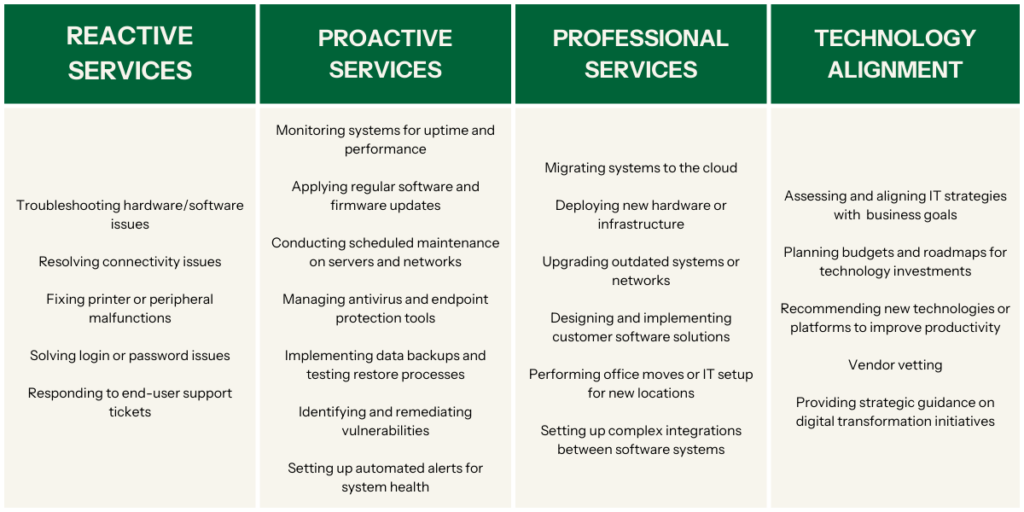Quick Overview
Looking for a quick explanation of the four essential components of IT management? Watch our four-minute video featuring Jim Egelston, MIS Solutions’ Operations Manager, as he breaks down:
- Help Desk Services – Your frontline support team
- Proactive Services – Behind-the-scenes maintenance and monitoring
- Professional Services – Project planning and implementation
- Technology Alignment – Strategic IT consulting and business alignment
Continue reading below for an in-depth exploration of each component and learn how they work together to deliver comprehensive IT management for your business.
Benefits of Outsourcing IT Management
Outsourcing part or all of IT support provides small and medium businesses with access to a deep bench of technology specialists who can manage every aspect of their network and systems. The key benefits are:
- Access to Expertise
- Cost Savings
- Enhanced Security and Compliance
- Scalability and Flexibility
- Proactive Maintenance and Support
- Access to Advanced Technology
However, searching for an MSP can be confusing. Unlike other professional service industries, managed IT is not regulated, which means anyone can claim to be an expert in IT. So, unless a business owner is technical and understands exactly what solutions are needed to move the business forward, it’s hard to tell if a provider is qualified to offer any service beyond reactive support.
Components of Effective Managed IT Services
MSPs come in all shapes and sizes, and they are not created equally, making it difficult to compare. When vetting MSPs, four main areas must be examined carefully.
Reactive Services
Most people think of reactive services when they hear the term IT support. It includes remote help desk services and onsite services for things like regular hardware maintenance. This is the team that responds when technology issues – such as inability to login to a system, password resets, profile issues – pop up. Reactive service team members are the “face” of the MSP. They are the ones end users interact with most, that’s why help desk technicians must be responsive, friendly, knowledgeable, and speak clearly so callers can understand the problem and the solution.
Unplanned IT downtime can drain businesses of $5,600 to $9,000 per minute, making rapid and effective reactive support essential to minimizing financial losses and operational disruptions.
Proactive Services
Reactive Services is just the tip of the iceberg when it comes to IT support. Several behind-the-scenes teams work around the clock to ensure your systems remain up and running. Proactive Services include network monitoring, regularly scheduled maintenance, security patching, data backups, and verification of backups of company assets. Proactive IT prevents issues from occurring in the first place and drastically reduces future problems and costly downtime. Proactive Services is a crucial component of managed IT services and ensures all areas of your network and systems are functioning properly.
Professional Services
Professional services include projects, office moves, migrations, upgrades and new technology installs. These types of services often require a more advanced skill set and fall outside of the scope of regular IT services. The IT provider’s projects team seeks to understand the impact on the business that a project will have, clearly defines the scope, timeline, and benchmarks of the project, and communicates regularly with the client on progress. Good project management is important for better results, staying within budget, and happier employees.
Technology Alignment
Technology Alignment is driven by an assigned Principal Consultant (PC) who serves as a liaison between the client and the other departments within the IT company. Their strategic guidance exceeds that of an account manager as they take a holistic approach to IT management and can make recommendations based on overall business goals.
The PC works closely with the client to understand business objectives and then develops and manages an IT roadmap to ensure those objectives are being met. A good PC will make the client aware of new technologies, such as advanced security solutions, that can help drive growth and improve productivity and security. Healthy engagement with a PC will keep an organization’s technology, people, and processes optimized, aligned, secure, and efficient.

In Conclusion
Not all MSPs have the knowledge, expertise, or resources to adequately provide anything beyond Reactive Services and limited Proactive Services. It can be a challenge to tell if an IT provider is qualified if you’re not sure what to look for.
On the other hand, operationally mature IT providers have proven processes that address all four buckets of IT management. If an IT vendor cannot articulate how they handle all four areas with distinct teams, that’s a clue that they handle everything as a reactive support ticket. Reactive support is more expensive in the long run as problems leading to downtime tend to be more frequent.
At MIS, we have dedicated teams to focus on the four buckets of IT management. We understand that it is critical to address all areas in order to keep clients’ systems secure and functioning smoothly. If you’d like more information about how we can help you run a better business with the right technology, book a discovery call with us HERE.
For additional information on things to consider, read How to Choose a Third-Party IT Provider Specializing in Small Business by the U.S. Chamber of Commerce.

